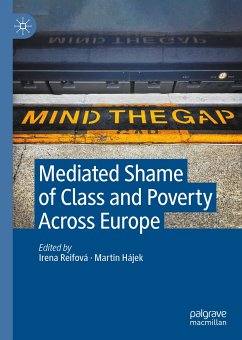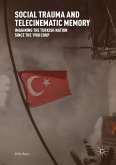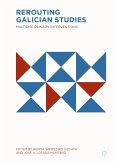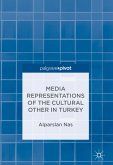Mediated Shame of Class and Poverty Across Europe (eBook, PDF)
128,39 €
inkl. MwSt.
Sofort per Download lieferbar
Mediated Shame of Class and Poverty Across Europe (eBook, PDF)
- Format: PDF
- Merkliste
- Auf die Merkliste
- Bewerten Bewerten
- Teilen
- Produkt teilen
- Produkterinnerung
- Produkterinnerung

Bitte loggen Sie sich zunächst in Ihr Kundenkonto ein oder registrieren Sie sich bei
bücher.de, um das eBook-Abo tolino select nutzen zu können.
Hier können Sie sich einloggen
Hier können Sie sich einloggen
Sie sind bereits eingeloggt. Klicken Sie auf 2. tolino select Abo, um fortzufahren.

Bitte loggen Sie sich zunächst in Ihr Kundenkonto ein oder registrieren Sie sich bei bücher.de, um das eBook-Abo tolino select nutzen zu können.
The key concepts of the book are media, class, poverty, and shaming. The contributors to this book examine how certain social relations and their cultural meanings in the media, namely class and poverty, are transformed into factual or moral attributes of people and situations. Class and poverty are not understood as certain things and actions, or concepts and numbers; both class and poverty are assumed to be, above all, particular social relationships or a set of relations between people, things and symbols. Without denying that contempt for the destitute Other is an affect found throughout…mehr
- Geräte: PC
- ohne Kopierschutz
- eBook Hilfe
- Größe: 3.99MB
- Upload möglich
Andere Kunden interessierten sich auch für
![The Dystopian Imagination in Contemporary Spanish Literature and Film (eBook, PDF) The Dystopian Imagination in Contemporary Spanish Literature and Film (eBook, PDF)]() Diana Q. PalardyThe Dystopian Imagination in Contemporary Spanish Literature and Film (eBook, PDF)60,98 €
Diana Q. PalardyThe Dystopian Imagination in Contemporary Spanish Literature and Film (eBook, PDF)60,98 €![The Years of Alienation in Italy (eBook, PDF) The Years of Alienation in Italy (eBook, PDF)]() The Years of Alienation in Italy (eBook, PDF)53,49 €
The Years of Alienation in Italy (eBook, PDF)53,49 €![Social Trauma and Telecinematic Memory (eBook, PDF) Social Trauma and Telecinematic Memory (eBook, PDF)]() Pelin BaşcıSocial Trauma and Telecinematic Memory (eBook, PDF)96,29 €
Pelin BaşcıSocial Trauma and Telecinematic Memory (eBook, PDF)96,29 €![European Television Crime Drama and Beyond (eBook, PDF) European Television Crime Drama and Beyond (eBook, PDF)]() European Television Crime Drama and Beyond (eBook, PDF)139,09 €
European Television Crime Drama and Beyond (eBook, PDF)139,09 €![Gender in Spanish Urban Spaces (eBook, PDF) Gender in Spanish Urban Spaces (eBook, PDF)]() Gender in Spanish Urban Spaces (eBook, PDF)85,59 €
Gender in Spanish Urban Spaces (eBook, PDF)85,59 €![Rerouting Galician Studies (eBook, PDF) Rerouting Galician Studies (eBook, PDF)]() Rerouting Galician Studies (eBook, PDF)89,99 €
Rerouting Galician Studies (eBook, PDF)89,99 €![Media Representations of the Cultural Other in Turkey (eBook, PDF) Media Representations of the Cultural Other in Turkey (eBook, PDF)]() Alparslan NasMedia Representations of the Cultural Other in Turkey (eBook, PDF)53,49 €
Alparslan NasMedia Representations of the Cultural Other in Turkey (eBook, PDF)53,49 €-
-
-
The key concepts of the book are media, class, poverty, and shaming. The contributors to this book examine how certain social relations and their cultural meanings in the media, namely class and poverty, are transformed into factual or moral attributes of people and situations. Class and poverty are not understood as certain things and actions, or concepts and numbers; both class and poverty are assumed to be, above all, particular social relationships or a set of relations between people, things and symbols.
Without denying that contempt for the destitute Other is an affect found throughout history and in various socioeconomic contexts, the chapters in this book – through their concern with the mediated gaze on class – narrate predominantly the challenges brought about by the media’s spectacular take on poverty and low status as they (at least) coincide with the neoliberal era.
This volume will be essential reading forthe scholars specialising in the study of media and social inequalities form the vantage points of Media Studies, Sociology, Anthropology or European Studies.
Without denying that contempt for the destitute Other is an affect found throughout history and in various socioeconomic contexts, the chapters in this book – through their concern with the mediated gaze on class – narrate predominantly the challenges brought about by the media’s spectacular take on poverty and low status as they (at least) coincide with the neoliberal era.
This volume will be essential reading forthe scholars specialising in the study of media and social inequalities form the vantage points of Media Studies, Sociology, Anthropology or European Studies.
Produktdetails
- Produktdetails
- Verlag: Springer International Publishing
- Erscheinungstermin: 5. Juli 2021
- Englisch
- ISBN-13: 9783030735432
- Artikelnr.: 62196075
- Verlag: Springer International Publishing
- Erscheinungstermin: 5. Juli 2021
- Englisch
- ISBN-13: 9783030735432
- Artikelnr.: 62196075
Irena Reifová is Assistant Professor at the Institute of Communication Studies and Journalism, Faculty of Social Sciences, Charles University, Prague, Czechia. She is focusing on cultural studies, theory of popular culture, television studies and post-socialist mediated memory. Since 2016 she has been working as ECREA General Secretary.
Martin Hájek is Associate Professor of Sociology at the Institute of Sociological Studies, Charles University, Prague, Czechia. His research interests are normative orders of society, symbolic interactionism, discourse and narrative analysis. He is the author of a monograph on various types of textual analysis and has published widely in peer-reviewed journals.
Martin Hájek is Associate Professor of Sociology at the Institute of Sociological Studies, Charles University, Prague, Czechia. His research interests are normative orders of society, symbolic interactionism, discourse and narrative analysis. He is the author of a monograph on various types of textual analysis and has published widely in peer-reviewed journals.
1. Chapter 1: Perspectives on Mediated Shame of Class and Poverty in European Contexts; Irena Reifová and Martin Hájek.- 2. Chapter 2: ‘Benefits Scroungers’ and Stigma: Exploring the Abject-Grotesque in British Poverty Porn Programming; Louise Cope.- 3. Chapter 3: Neural Attunement to Others: Shame, Social Status, and Rewarded Viewing in Reality Television in Sweden; Anja Hirdman.- 4. Chapter 4: Shame, (Dis)Empowerment and Resistance in Diasporic Media: Romanian Transnational Migrants’ Reclassification Struggles; Irina Diana Mădroane.- 5. Chapter 5: Mediating Class in a Classless Society? Media and Social Inequalities in Socialist Eastern Europe; Sabina Mihelj.- 6. Chapter 6: Invisibility or Inevitability: Performing Poverty in Czech Reality Television; Martin Hájek and Daniel Frantál.- 7. Chapter 7: Shaming Working-Class People on Reality Television: Perspectives from Swedish Television Production; Peter Jakobsson and Fredrik Stiernstedt.- 8. Chapter 8: Disparaging ‘the Assisted’: Shaming and Blaming Social Welfare Recipients in Romania and Hungary; Hanna Orsolya Vincze, Andreea Alina Mogoș and Radu Mihai Meza.- 9. Chapter 9: Othering without Blaming: Representing Poverty in Flemish Factual Entertainment ; Alexander Dhoest, Marleen te Walvaart and Koen Panis.- 10. Chapter 10: Inter- and Intranational Mediated Shaming to Justify Austerity Measures: The Case of the ‘Greek Crisis’; Yiannis Mylonas.- 11. Chapter 11: Social Distances through Scopic Practices: How Czech Reality Television Audiences Negotiate Social Inequalities ; Irena Reifová.- 12. Chapter 12: Everybody is a Fool: Rural Life, Social Order and Carnivalesque Marginalisation in a Hungarian Television Series; Balázs Varga.
1. Chapter 1: Perspectives on Mediated Shame of Class and Poverty in European Contexts; Irena Reifová and Martin Hájek.- 2. Chapter 2: 'Benefits Scroungers' and Stigma: Exploring the Abject-Grotesque in British Poverty Porn Programming; Louise Cope.- 3. Chapter 3: Neural Attunement to Others: Shame, Social Status, and Rewarded Viewing in Reality Television in Sweden; Anja Hirdman.- 4. Chapter 4: Shame, (Dis)Empowerment and Resistance in Diasporic Media: Romanian Transnational Migrants' Reclassification Struggles; Irina Diana Madroane.- 5. Chapter 5: Mediating Class in a Classless Society? Media and Social Inequalities in Socialist Eastern Europe; Sabina Mihelj.- 6. Chapter 6: Invisibility or Inevitability: Performing Poverty in Czech Reality Television; Martin Hájek and Daniel Frantál.- 7. Chapter 7: Shaming Working-Class People on Reality Television: Perspectives from Swedish Television Production; Peter Jakobsson and Fredrik Stiernstedt.- 8. Chapter 8: Disparaging 'the Assisted': Shaming and Blaming Social Welfare Recipients in Romania and Hungary; Hanna Orsolya Vincze, Andreea Alina Mogo and Radu Mihai Meza.- 9. Chapter 9: Othering without Blaming: Representing Poverty in Flemish Factual Entertainment ; Alexander Dhoest, Marleen te Walvaart and Koen Panis.- 10. Chapter 10: Inter- and Intranational Mediated Shaming to Justify Austerity Measures: The Case of the 'Greek Crisis'; Yiannis Mylonas.- 11. Chapter 11: Social Distances through Scopic Practices: How Czech Reality Television Audiences Negotiate Social Inequalities ; Irena Reifová.- 12. Chapter 12: Everybody is a Fool: Rural Life, Social Order and Carnivalesque Marginalisation in a Hungarian Television Series; Balázs Varga.
1. Chapter 1: Perspectives on Mediated Shame of Class and Poverty in European Contexts; Irena Reifová and Martin Hájek.- 2. Chapter 2: ‘Benefits Scroungers’ and Stigma: Exploring the Abject-Grotesque in British Poverty Porn Programming; Louise Cope.- 3. Chapter 3: Neural Attunement to Others: Shame, Social Status, and Rewarded Viewing in Reality Television in Sweden; Anja Hirdman.- 4. Chapter 4: Shame, (Dis)Empowerment and Resistance in Diasporic Media: Romanian Transnational Migrants’ Reclassification Struggles; Irina Diana Mădroane.- 5. Chapter 5: Mediating Class in a Classless Society? Media and Social Inequalities in Socialist Eastern Europe; Sabina Mihelj.- 6. Chapter 6: Invisibility or Inevitability: Performing Poverty in Czech Reality Television; Martin Hájek and Daniel Frantál.- 7. Chapter 7: Shaming Working-Class People on Reality Television: Perspectives from Swedish Television Production; Peter Jakobsson and Fredrik Stiernstedt.- 8. Chapter 8: Disparaging ‘the Assisted’: Shaming and Blaming Social Welfare Recipients in Romania and Hungary; Hanna Orsolya Vincze, Andreea Alina Mogoș and Radu Mihai Meza.- 9. Chapter 9: Othering without Blaming: Representing Poverty in Flemish Factual Entertainment ; Alexander Dhoest, Marleen te Walvaart and Koen Panis.- 10. Chapter 10: Inter- and Intranational Mediated Shaming to Justify Austerity Measures: The Case of the ‘Greek Crisis’; Yiannis Mylonas.- 11. Chapter 11: Social Distances through Scopic Practices: How Czech Reality Television Audiences Negotiate Social Inequalities ; Irena Reifová.- 12. Chapter 12: Everybody is a Fool: Rural Life, Social Order and Carnivalesque Marginalisation in a Hungarian Television Series; Balázs Varga.
1. Chapter 1: Perspectives on Mediated Shame of Class and Poverty in European Contexts; Irena Reifová and Martin Hájek.- 2. Chapter 2: 'Benefits Scroungers' and Stigma: Exploring the Abject-Grotesque in British Poverty Porn Programming; Louise Cope.- 3. Chapter 3: Neural Attunement to Others: Shame, Social Status, and Rewarded Viewing in Reality Television in Sweden; Anja Hirdman.- 4. Chapter 4: Shame, (Dis)Empowerment and Resistance in Diasporic Media: Romanian Transnational Migrants' Reclassification Struggles; Irina Diana Madroane.- 5. Chapter 5: Mediating Class in a Classless Society? Media and Social Inequalities in Socialist Eastern Europe; Sabina Mihelj.- 6. Chapter 6: Invisibility or Inevitability: Performing Poverty in Czech Reality Television; Martin Hájek and Daniel Frantál.- 7. Chapter 7: Shaming Working-Class People on Reality Television: Perspectives from Swedish Television Production; Peter Jakobsson and Fredrik Stiernstedt.- 8. Chapter 8: Disparaging 'the Assisted': Shaming and Blaming Social Welfare Recipients in Romania and Hungary; Hanna Orsolya Vincze, Andreea Alina Mogo and Radu Mihai Meza.- 9. Chapter 9: Othering without Blaming: Representing Poverty in Flemish Factual Entertainment ; Alexander Dhoest, Marleen te Walvaart and Koen Panis.- 10. Chapter 10: Inter- and Intranational Mediated Shaming to Justify Austerity Measures: The Case of the 'Greek Crisis'; Yiannis Mylonas.- 11. Chapter 11: Social Distances through Scopic Practices: How Czech Reality Television Audiences Negotiate Social Inequalities ; Irena Reifová.- 12. Chapter 12: Everybody is a Fool: Rural Life, Social Order and Carnivalesque Marginalisation in a Hungarian Television Series; Balázs Varga.







